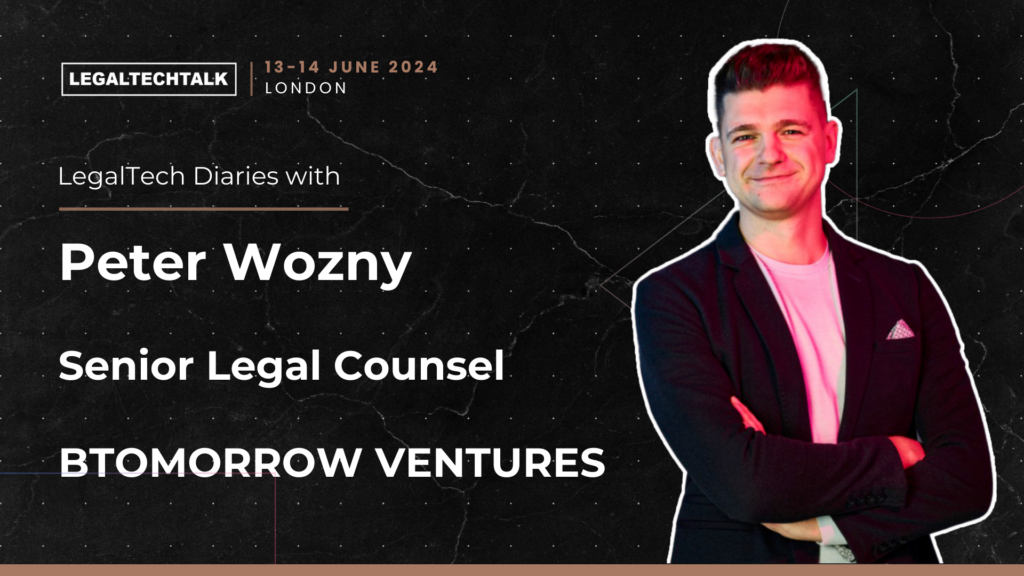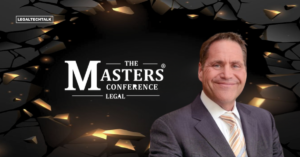In this practical interview, Peter Wozny, Senior Legal Counsel at Btomorrow Ventures, shares his insights on building an award-winning in-house legal team. He emphasises understanding the business and tailoring the team’s capabilities accordingly, hiring technically strong team members who communicate well and fit the culture, and striking the optimal balance of in-house lawyers and outside counsel.
Peter discusses the transformative impact of legal technology in boosting productivity, security, and work-life balance. He advocates championing diversity, equity and inclusion from the top down, ensuring diverse upper management, supporting employee groups, and keeping DEI high priority.
Bradley Collins: Hi Peter, great to chat. I’d love to hear any learnings you can share in building an award-winning legal department?
Peter Wozny: Every legal team is going to be different as it needs to fit in with the wider organization to provide efficiency and success.
Remember the ultimate goals of a legal team are to ensure the smooth operations of the business, supporting everyone: whether it’s entering into new client and supplier arrangements; dealing with HR issues; compliance; managing disputes; supporting on strategy, or ensuring the business is correctly operating in accordance with local laws and regulations.
The team needs to be tailor-made to accommodate the business and its broader regulatory environment. That’s why it’s so important to fully understand and set the right goals and the scope of work that is needed.
Building the Team
Once you ‘know your client’, you can then start to build the team around you to fill in the capabilities.
Hiring the right people is vitally important. Not only should they be able to manage the projects and be able to technically jump into different tasks to bring them to an efficient close, but they also need to culturally fit in with the broader team. Communication is key here, being able to work effectively as a team and independently. You can especially see this in smaller businesses where the wrong hire can greatly impact the rest of the team, its culture, and the operations as a whole.
Don’t forget to have junior or paralegal support for your legal team. The experienced members will need support as the business grows and there are more tasks to do. Whether these come from direct hires or secondees from external counsel, this also gives an opportunity to help teach and empower the legal teams of tomorrow.
Resource and Support
Having the right balance and relationship between your in-house team and external counsel is key.
For the larger and more complex tasks or for where you need specific technical knowledge, you can always outsource and lean on external counsel to support. To ensure efficiency, speed and good work, look to establish a panel of firms which is periodically reviewed. They should cover a broad range of capabilities while ensuring they stay competitive against each other to keep costs down and to avoid complacency in work.
And don’t forget to sign up for conferences, training, events, and news alerts. You need to build and maintain your legal knowledge and be a good lawyer. Set out yearly targets and goals for training and development. But also listen and get feedback from the wider business. At the end of the day, they are the client and need to be satisfied!
Bradley Collins: Great stuff! I’m also interested to hear how, as a legal leader, the most transformational business outcome you’re proud to have been responsible for, and why?
Peter Wozny: Having the right legal tech is vital. Not only for efficiency and productivity but to ensure a successful business. How would businesses have survived during the Covid lockdowns without access to connectivity between team members or cloud-based solutions to facilitate the growing need to work from multiple locations?
Gone are the days when paper ruled the legal world. In today’s industry, whether it’s small in-house legal teams or large legal firms, the ever-evolving legal technology sector has fundamentally transformed the business. This doesn’t just make for an efficient business; it provides improvements to teams as well as opportunities to save budget and better utilise employees.
Implementing good technology and AI can now help free up a lawyer’s time and at the same time, increase document safety and cyber security. The benefits can pay off in improving mental health and wellbeing and supporting a better work/life balance. In the legal team at BTV, we’ve ensured we have implemented to most up-to- date legal tech to help us with our everyday workloads.
Bradley Collins: Finally, what does DEI mean for you, and what advice would you like to offer to the industry on this topic?
Peter Wozny: To create a more innovative, joyful and productive workplace, Diversity, Equity & Inclusion (DEI) is vitally important. I am committed to ensuring we have a diverse team at BTV, that everyone is treated equally, and that they are all included so they give their best to the organisation. But what does DEI mean?
- Diversity is the difference in the workplace. Whether it’s race, ethnicity, gender, identity, sexual orientation, age, or disability for example.
- Equity is the process of ensuring that practices are impartial and fair, providing equal outcomes for every individual.
- Inclusion is ensuring that people have a sense of belonging in the workplace, so they are comfortable and can be their authentic selves.
DEI needs to be led from the top. The senior leaders in the business are the trendsetters. Others look to them for inspiration as ultimately, everyone is aiming for success or to get to the top. So the senior leaders not only have to practice good DEI, but their management teams and boards need to consist of a diverse group to ensure authenticity and accountability.
Employees thrive on seeing themselves represented at the top. To have good role models encourages them to work hard and to achieve their best results.
But DEI also needs doers, people within the business to actively push for positive change. They don’t have to be diverse themselves, they could be allies. But change won’t happen overnight and it needs people from the organisation to support the cause. Whether it’s helping to lead employee resource groups, putting in place better policies, or organising Pride and International Women’s Day events.
DEI should always be on the agenda.
Read all 13 interviews with legal experts in our latest LegalTech Diaries Volume 3: https://www.legaltech-talk.com/legaltechdiaries/volume-3/
Peter will also be speaking at LegalTechTalk 2024 on 13-14th June 2024 at InterContinental O2 in London where over 2,500 in-house and law firm leaders, legaltech startups, and investors will join us for 2 full days of insights and networking. See more here: https://www.legaltech-talk.com/








